
AFFORDABLE AND CLEAN ENERGY
INTODUCTION
.png) |
“Ensure access to affordable, reliable, sustainable, and modern energy for all” Sustainable Development Goal 7 aims to ensure affordable, reliable, sustainable, and clean energy for all. About 20% of the world’s population has no access to modern electricity. About 3 billion people use wood and charcoal for cooking, which causes pollution, affects health, and generates greenhouse gases that affect the climate. India’s share in the world’s primary energy consumption is just 6%. Energy disparity is greater in rural areas, and that hinders progress. The advancement in technology and changes in government policies aim to reduce the cost of renewable energy. Ensuring access to clean, affordable, reliable, and sustainable energy will help in improving health, reduce poverty, mitigate climate change’s effect, and benefit the environment.
Nitte (DU)’s mission towards affordable and clean energyThe University is committed to conserving power by practicing maximum utilization: minimum wastage on campus. The University strives towards practicing efficient use of energy and generating and using clean energy while reducing the use of conventional energy.
Green EnergyNitte (DU) works towards reducing conventional energy usage and relying more on alternative green energy sources such as solar energy and wind energy in addition to hydroelectric power and biogas. The University sources electric power from the local electricity board (MESCOM), a private power vendor, and incampus solar power units. Nearly 2/3rd of the total requirement comes from renewable energy sources. Intending to contribute towards the green initiative, the University has entered into an open access agreement for Hydro and wind energy with M/s. AMR Power Pvt Ltd, M/s. Doddanavar Global Energy Pvt Ltd and M/s. Brindavan Hydropower Pvt Ltd. In 2022, about 51 % of electrical power was through renewable sources.
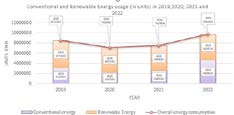
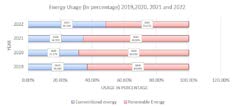
The Nitte (DU) has on-campus Solar power generators. Power for the street lamps on all the campuses is sourced from solar panels. Solar Panels of about 500 KW capacity have been installed across the rooftops of most of the buildings on the university campus to maximize the use of on-site renewable energy generation wherever practical. Furthermore, for use, clean energy is wheeled from various hydro, solar, and wind sources.
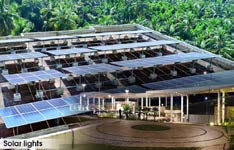
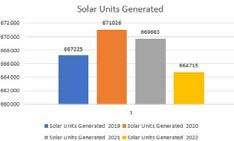
The Biogas unit is used for recycling organic waste. The biogas plant generates cooking gas for the common kitchen.
Energy savings measures:The University continu replace conventional light fittings with energy-saving LED lights in a phased manner. Timers have been installed at various locations for switching on/ off security lights, which helps minimize energy consumption. Solar water heaters have been installed in all hostels to provide hot water to the residents. In all the critical areas, VFDs (Variable frequency drives), which help reduce running costs and improve the life of motors, have been installed. A synchronization panel/ load manager has been provided for DG sets at all campuses to ensure optimum power generation utilization. Periodical maintenance/AMC of all electrical equipment, including panels, is carried out as per schedule. Additionally, all critical equipment has been provided with closely monitored AMC,which helps enhance the equipment’s life and reduces the mean time between failures.
Energy Audit:Energy conservation is the concern and responsibility of every member of the University, irrespective of their position. The University conducts regular energy audits to assess the usage and growth in demand due to rapid expansion. The energy audit aims to provide an information base for the overall.
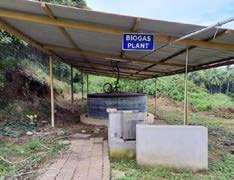
energy conservation program covering energy utilization analysis and evaluation of energy conservation measures along with a proactive effort to minimize environmental effects.
Green transportation:The University has an electric car to carry faculty and other staff between various office buildings within the university campus. There is also a battery-operated buggy to carry students from hostels to their college and hospital classrooms. Twenty cycles are made available for staff and students.

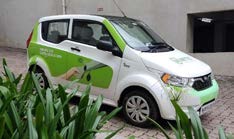

Staff, students, and other employees are strongly encouraged to avail themselves of the common transport facilities provided by the University. There are Nineteen buses that cater to the standard mode of transportation. An additional six vans of 14-seater capacity regularly commute between campuses and the city to transport staff, students, and other employees of the University.
Green Buildings:The Building Science Lab at the Nitte Institute of Architecture aims to quantify the building’s energy performance.
to commute to the university campus.
Energy conservation awareness programsNitte (DU) is committed to conserving energy. It believes energy saved is energy generated. Every institute is equipped with educational instructions in all classroom/seminar rooms and halls to switch off lights, fans, air conditioners, and other electrical equipment after use. Electrical appliances have reminders to switch off after use displayed prominently near the switchboard. The elevators are accompanied by reminders to encourage commuters to use the steps and conserve electricity. The displays remind commuters to reduce their carbon footprint. The hospital wards have displays reminding the patients to conserve electricity.


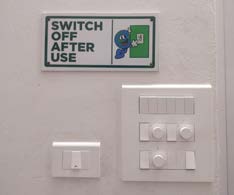
National Energy Conservation Day 2022:
National Energy Conservation Day was held on Thursday, December 22, 2022, at the Nitte University Auditorium on the Paneer Campus. The event began at 3:00 p.m. and featured various speakers and activities focused on the importance of energy conservation. The event was opened by the Dean of Nitte University, Prof. Vinod Aranha, who welcomed attendees and stressed the importance of reducing energy consumption to protect the environment and ensure a sustainable future.
The main speaker at the event was Ar. Tejendra Nagaboina provided an overview of current energy usage trends and discussed how individuals and communities can reduce their energy consumption. This included tips for using energy-efficient appliances and adopting renewable energy sources.
At the conclusion of the event, awards were distributed for the best slogans and idea posters related to energy conservation. The event was well-attended and received positive feedback from attendees, who appreciated the informative and engaging presentations. Overall, the National Energy Conservation Day was a success and helped in raising awareness about energy conservation’s importance.
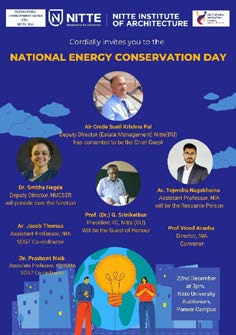
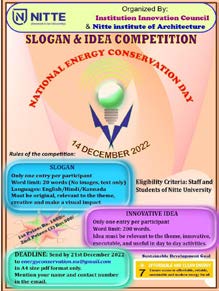
World Biofuel Day :
The Dept. of Biotechnology, NMAM Institute of Technology, Nitte, in association with the Udupi District Bioenergy Research, Information & Demonstration Centre (BRIDC) celebrated World Biofuel Day on 10th August 2022 by distributing biofuel saplings to the students of Kalya Government School. On 13th August, saplings were planted in the Nitte Engineering college campus.
Dr. Niranjan Chiplunkar, Principal, NMAMIT, inaugurated the event by planting the biofuel saplings. Dr. Ujwal P, Head, Dept. of Biotechnology, along with the teaching, nonteaching staff, and final year students, actively participated in the event.
Education and ResearchNitte Institute of Architecture provides a Bachelor of Architecture program. Approximately 50-60 students are enrolled in these courses per year. The program incorporates courses related to energy-efficient and sustainable architecture, intelligent buildings, and LEED lab, which includes LEED certification, energy conservation building code, solar energy for lighting, green buildings, renewable energy, and energyefficient design for buildings as elective subjects for students. These programs support creative exploration and nurture students’ journey towards sustainable architectural practice. The University has Architecture Design Studio 2 and Environmental Design Studio, and active research is being conducted on constructing green buildings suitable for the climate.
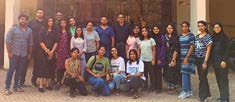
LEED Lab March 2023 6-day workshop.
Inauguration of Renewable Energy Club and a one-day workshop on ‘New and Renewable Sources of Energy’:The Department of Mechanical Engineering, NMAMIT, organized a one-day workshop on ‘New and Renewable Sources of Energy’ on the occasion of the inauguration of the ‘Renewable Energy Club’ of the department on 22nd August 2022.
Dr. Nagesh, Chairperson & Professor, Industrial & Production Engineering, UBDT Davangere, and Dr. Sathyabhama, Professor, Dept. of Mechanical Engineering, NITK Surathkal, were the guests of honor for the function. Dr. Nagesh stressed the significance of education in one’s life. Education/ knowledge is the only wealth that gets increased upon sharing. Dr. Sathyabhama stressed the importance of the need for renewable energy against conventional sources.
Dr. I R. Mithanthaya, Vice Principal & Dean (Academics) NMAMIT, inaugurated the Renewable Energy Club and congratulated the department and student members for starting the club, which is the need of the hour.
In his presidential remarks, Dr. Niranjan, Principal, NMAMIT, said that renewable energy sources like solar and wind energy are always available in nature, free of cost. We just need to work on the mechanism of converting it from one form to another, depending on our requirements.
Dr. Srinivasa Pai P, Head of the Department of Mechanical Engineering, welcomed the gathering and briefed about the workshop. Dr.Rashmi P. Shetty introduced the guests of honor. Dr. A. K. Somayaji, Program Convenor, delivered the vote of thanks. Dr. Ajith Hebbale, Associate Professor, Dept. of Mechanical Engineering, was the master of the ceremony.

Nitte Blog Event
23 March 2022: News from NMAMIT – AICTE funding support to NMAMIT for fuel cell research: NMAMIT has received research funding of INR 13.33 lakhs for the purpose of conducting research in the field of Fuel Cell Technology by the All-India Council for Technical Education, New Delhi. The funding awarded will be used for carrying out investigations on PEM fuel cell modules with Novel flow field arrangements to improve the efficiency of the fuel cell. The research will also include the study of the presence of pinholes in the membrane and determine its effect on the durability and efficiency of the fuel cell. Dr. Sudesh Bekal, Dean (R&D), is the Principal Investigator, and Mr. Aneesh Jose is the Co-Investigator for the project. The research is expected to be completed in 3 years.
Awards:Master Abhay Puranik of Class 8, from Dr N. Shankara Adyanthaya Memorial English Medium High School of Nitte Education Trust, had couriered his Project idea of ‘POWER GENERATION FROM WASTEWATER MANAGEMENT’ to the Hon’ble Prime Minister, Shri Narendra Modi, and his idea was referred to Karnataka Renewable Energy Development Limited, for which the student has received a letter of appreciation. If the KREDL Authorities approve the said technology, he will be given full support in developing it further.
A Sustainable Approach for Future Expansion:
The Master Plan of the upcoming campus expansion aligns with the University’s commitment to creating sustainable and regenerative spaces with minimal environmental impact and will set exemplary standards in sustainable landscapes.
Publications- Kumar P.K. A Method for Evaluating Energy Retrofits in Historical Structures. Journal of Pharmaceutical Negative Results, Jan 2022; 13(5): 1390 - 1399.
- Jathanna, H.M., Rao, C.V. Non-detoxified acid hydrolysate of de-oiled Pongamia seed cake as a low-cost solution to microbial oil synthesis. Current Research in Biotechnology, Jan 2022; 4: 247-252.
- Nayak, J., Bhat, R.S., Chethan, D.M. Synthesis, Characterization, Antimicrobial and Corrosion Inhibition Studies of Fused Oxadiazolo-quinolines. Chemistry select, Jan 2022; 7(3): e202103543.
- Deekshitha K., Rao M.S., Rebello N., Ramaprasad A.T., Jayarama A., Pinto R. A Novel cross-linked PVA-Chitosan composite membrane for heavy metal filtration applications. Materials Today: Proceedings, Jan 2022; 66(4): 2493 – 2498.
- Chate, G.R., Kulkarni, R.M., Manjunath, P.G.C., Lakshmikanthan, A., Harsha, H.M., Tophakhane, S., Shaikh, N., Kongi, S., Iranavar, P. Synthesis and characterization of Fe2O3 nanoparticles reinforced to recycled industrial aluminium scrap & waste aluminium beverage cans for preparing metal matrix. Frattura Ed Integrita Strutturale, April 2022; 16(60).
- Yogeshwary, B.H., Shivaprakasha, K.S., Yashwanth, N. Node Localization Techniques in Underwater Sensor Networks. International Conference On Sustainable Computing And Data Communication Systems, 2022 – Proceedings. April 2022.
- Santhosh, G., Nayaka, G.P., Bhatt, A.S. Ultrahigh capacitance of NiCo2O4/ CeO2mixed metal oxide material for supercapacitor applications. Journal Of Alloys and Compounds, April 2022; 899: 163312.
- Shetty C., Hegde N P., Dhananjaya B., Deepa, Rashmi N., Sarojadevi H., Shenoy A. noTrash. AI - An Approach Towards the Hygienic City based on Deep Learning. Proceedings - 2022 6th International Conference on Intelligent Computing and Control Systems, ICICCS 2022. May 2022.
- Venkataramana, S.H., Shivalingaiah, K., Davanageri, M.B., Selvan, C.P., Lakshmikanthan, A., Chandra shekarappa, M.P.G., Razak, A., Anand, P.B., Linul, E. Niger Seed Oil-Based Biodiesel Production Using Transesterification Process: Experimental Investigation and Optimization for Higher Biodiesel Yield Using Box–Behnken Design and Artificial Intelligence Tools. Applied Sciences, June 2022; 12(12):5987.
- Desai S., Manapragada N.V.S.K., Shukla A.K., Pignatta G. Mould-Growth Study in Building Materials Exposed to Warm and Humid Climate Using Heat and Mass Transfer (HAMT) EnergyPlus Simulation Method. Sustainability, July 2022; 14(14): 8292.
- Afza N., Shivakumar M.S., Alam M.W., Kumar A.N., Bhatt A.S., Murthy H.C.A., Ravikumar C.R., Mylarappa M., Selvanandan S. Facile hydrothermal synthesis of cerium oxide/ rGO nanocomposite for photocatalytic and supercapacitor applications. Applied Surface Science Advances, October 2022; 11: 100307.
- Nayak S., Goveas L.C., Selvaraj R., Vinayagam R., Manickam S. Advances in the utilisation of carbon-neutral technologies for a sustainable tomorrow: A critical review and the path forward. Bioresource Technology, Nov 2022; 364:128073.
- Shankara S.D., Isloor A.M., Kudva A.K., Raghu S.V., Jayaswamy P.K., Venugopal P.P., Shetty P., Chakraborty D. 2,5-Bis(2,2,2 -trifluoroethoxy) phenyl-tethered 1,3,4- Oxadiazoles Derivatives: Synthesis, In Silico Studies, and Biological Assessment as Potential Candidates for Anti-Cancer. Molecules, Dec 2022; 27(24): 8694

